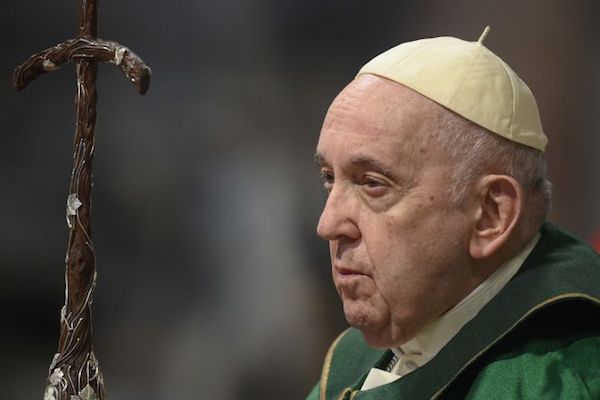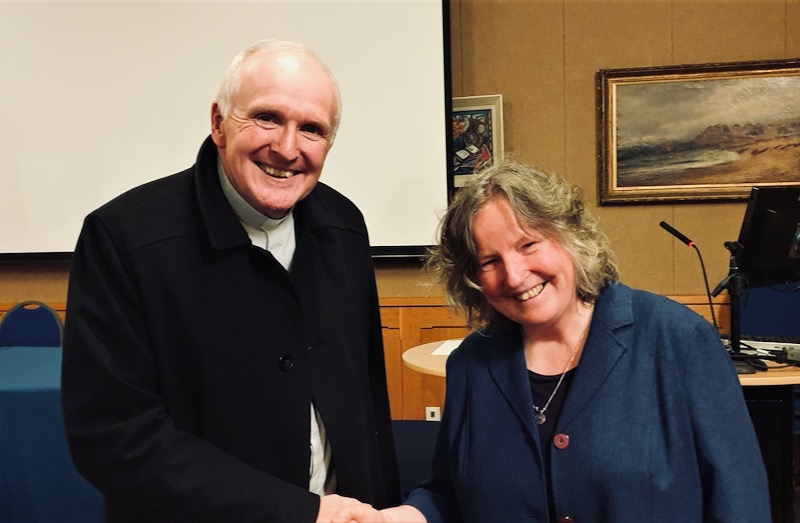A leading cardinal has called for efforts to help make Catholic social teaching “less hidden” in order to help save the environment.
“The earth, our common home, and the local and global relationships which nurture and sustain it, are confronted by a time of unprecedented fragility,” Cardinal Michael Czerny SJ said as he co-presented the 2023 Trócaire Lenten address this week.
He told bishops, priests, Religious and Trócaire staff gathered in St Patrick’s College, Maynooth and online from around the world: “This makes the course we are called to navigate today uniquely complex – some might even say treacherous.
“One wrong move and the potential for global destruction on a scale even greater than seen in the Second World War is alarmingly real.”
The theme of the Czechoslovakian-born Canadian prelate’s online presentation was “In Times of Unprecedented Crises – How can Catholic Social Teaching Help Us to Navigate Fragility and Lead us to Local Power and Global Justice?”
“The theme is compelling and the challenge it highlights is urgent,” the Prefect of the Vatican’s Dicastery for Promoting Integral Human Development said.
He warned that the failure to build relationships built on deep trust, solidarity and care, both locally and globally, “will impede the urgently needed action to address together the existential crises faced by our beautiful and extraordinary planet with all the teeming life it holds as a gift to us and for us”.
Discussing the importance of Catholic Social Teaching, he told his audience, “As Laudato Si’ reminds us, one of the key navigational aids that the Lord has provided to help us chart new ways through our current crises, is the rich and dynamic tradition of Catholic social teaching – sometimes referred to as the hidden treasure of the Catholic Church.”
According to Cardinal Czerny, the task is to make Catholic social teaching “less hidden”.
“It is our task to make it the guiding star that charts us to a better future for all and caring for our common home.”
Recalling the Irish bishops’ decision to establish Trócaire 50 years ago in 1973, he noted it was built on the impetus of Vatican II and rooted in the principles of Catholic social teaching.
“The Irish bishops with their lay collaborators were visionary in establishing this lay-led global instrument of solidarity and compassion,” he stated as he told his audience it was “an honour and a pleasure” to help them celebrate Trócaire’s fiftieth anniversary.
“The Irish of course were already well known around the world for their extraordinary work as missionaries as well as for their outstanding empathy and generosity to those in need. But a key part of the success of this initiative was that it brought the link between the local – in fact between the domestic church in the home – and the global to a whole new level.”
He continued: “This is no more clearly seen than in the uniquely Irish Lenten phenomenon known as the Trócaire box. That this simple idea of the house shaped box on the family hearth during Lent has become so embedded in Irish culture – even among those with no connection to the Church – is an incredible testimony to the pastoral genius of those who founded and continue to develop the work of Trócaire to this day.”
Reading the introduction to Trócaire’s strategic plan (2021-25), he said he was particularly impressed by the sentence: “Our world has changed since our foundation in 1973 and so have we. But we remain rooted in the values that shape us and in our belief that a more just and sustainable world is possible.”
He stressed that “Catholic social teaching helps us to stay on the right track always seeking to enhance the dignity of the human person and the common good through subsidiarity and solidarity”.
“Solidarity is the golden rule of Catholic Social Teaching – treating others as you wish to be treated yourself, and subsidiarity is respect for the freedom and responsibility of the local rather than imposing from above.”
“We must also recognise that Catholic social teaching as an expression of a living Church is something that needs to be understood, interpreted, and updated, to better respond to the needs of the times. Like all church teaching, Catholic social teaching has always been a dynamic reality, never static.”
He explained that all are called to be active participants in refreshing the social teaching of the Church today.
Pope Francis’ special emissary to refugees from Ukraine paid tribute to the Irish government and the Irish people for their “outstanding welcome, generosity and support to the thousands of refugees who have come to Ireland from Ukraine in search of safety and hope”.
The Prefect of the Vatican’s Dicastery for Promoting Integral Human Development, visited Ukraine last March, sent by Pope Francis to bring solidarity and support to those fleeing the war said, “Your proud reputation as a land of a thousand welcomes remains justly intact.”
He acknowledged that “creating a safe and welcoming space for the stranger who is in need is not an easy ideal especially when housing and other resources are already so stretched”.
The top Vatican cardinal also paid tribute to Trócaire and other Irish agencies for their generous solidarity and support to local non-state actors on the frontline of humanitarian aid in Ukraine, which he said he was privileged to witness “first hand during his visit to Ukraine on behalf of the Holy Father”.
Elsewhere in his address, Cardinal Czerny said, “Ireland has much to offer the world in terms of its experience of building a process of peaceful resolution of historic, political conflict in spite of current difficulties”.
He underlined the “urgency” of building relationships at the local and global level which he said was core to a practical and comprehensive “ecology of peace”.
Building relationships has the potential to unlock some of the most deeply ingrained reflexes of self-interest and fear at the root of conflict, he said.
In her address on the relationship between the global and the local in Catholic Social Teaching, co-presenter of the 2023 Trócaire Lenten address, Dr Ethna Regan CHF, said the “fecundity” and the variety of Catholic social teaching that has emerged from the local churches across the world “is very striking”.
Themes addressed include tourism, governance, drug cartels, free elections, culture, climate change, prisons, domestic violence, tribalism, unemployment, poverty, democracy, and migrants and refugees. There has been increased intercontinental collaboration on statements, for example, between the German and the African episcopal conferences.
One of the areas the Associate Professor of Theology and Ethics at Dublin City University discussed in her address was turning the principles of Catholic social teaching inwards, ad intra, and the impact of the abuse crisis on credibility.
“We cannot, of course, celebrate the contribution of Catholic Social Teaching at this moment in the history of the Church without continually acknowledging the reality out of which the Church endeavours to speak to the world on matters of justice,” she said.
Dr Regan, who holds a PhD from Cambridge University and an MA from Fordham University and has wide international experience in the areas of human rights, conflict, poverty and social inequality, recalled that one of the major figures of early modern Catholic social thought, Wilhelm Emmanuel von Ketteler, Bishop of Mainz 1850 -77, took a radical position on the question of child labour.
Twenty years prior to the publication of Leo XIII’s 1891 encyclical Rerum Novarum (On the Condition of Labour), von Ketteler called for the elimination of child labour.
In a famous sermon of 1869, he said: ‘I regard child-labour in factories as a monstrous cruelty of our time … Religion in its great love for children cannot but support the demand for the prohibition of child-labour in factories.’
Dr Regan noted that Rerum Novarum did not call for the abolition von Ketteler passionately advocated for “but, nonetheless, we can see a relative radicalism in the approach to justice for children in the nineteenth century”.
She told her audience that it was therefore, “a source of great sadness and shame that the area in which the Church expressed relative radicalism at the inception of modern Catholic Social Teaching, justice for children, has become the very area on which the institution has floundered, profoundly damaging our capacity and credibility in the public domain on matters of justice.”
She said the ongoing challenge is to make the principles of Catholic Social Teaching operative in the Church’s response to the global sexual abuse crisis, particularly in its engagement with those who have been abused.
“Our rich social tradition that has been directed to the industrial revolution, to war and peace, to poverty and to climate justice must be directed also ad intra as we seek a just response to the ongoing abuse crisis.”
Dr Regan added, “The principle of dignity, founded on understanding the person as Imago dei, must be directed towards restorative dignity. There is a duty of solidarity towards those who have been abused, those falsely accused, and those affected by the ripples of trauma.”
Social analysis, and the recognition of structural sin, must find expression in an institutional analysis that focuses not just on eliminating risk, but on developing accountability and transparency in relation to information, processes, and structures, she said.
The Holy Faith Sister, who as chairperson of Credo Foundation for Justice, a non-governmental organisation based in Port of Spain under the auspices of the Holy Faith Sisters, worked with socially displaced children, and was active in the campaign for the abolition of the death penalty in the Caribbean, suggested that perhaps the model of truth and reconciliation commissions, supported by the Church in post-conflict societies, might also guide a way forward.
Elsewhere in her address, Dr Regan noted that two of the eight main objectives of the 2023 Synod outlined in the Preparatory Document address the question of justice ad intra, and the implications of the internal for external credibility.
She said these objectives apply not just to the abuse crisis, but also to the broader issues of justice in the Church, including the role of women in the Church, “for we cannot be challenging ‘the exclusion of women’s voices and perspectives from decision-making spaces’ in our development work, without considering this exclusion within the Church”.
According to Dr Regan, turning the principles of Catholic Social Teaching ad intra is one of the Church’s most pressing responsibilities, to ensure that it is a credible subject and reliable partner working with all people of good will in matters of global and social justice.
“Fundamentally, our very capacity for authentic proclamation of the Gospel, which is at the heart of our social teaching, is at stake,” she warned.
While the world has changed since Trócaire was founded in 1973, and the Church’s reputation is permanently scarred, what has not changed – and has indeed increased – is human vulnerability in the face of climate change, and an illegal war that is causing incredible human damage in Ukraine with the ensuing global implications for food security and political stability, she said.
“What is unchanging is the imperative for Catholic social teaching to remain dynamic in research and practice, enabling us all to remain open-hearted, hopeful, realists who are maladjusted to the injustice and inequality in our world,” Dr Regan said.



 Loading ...
Loading ...